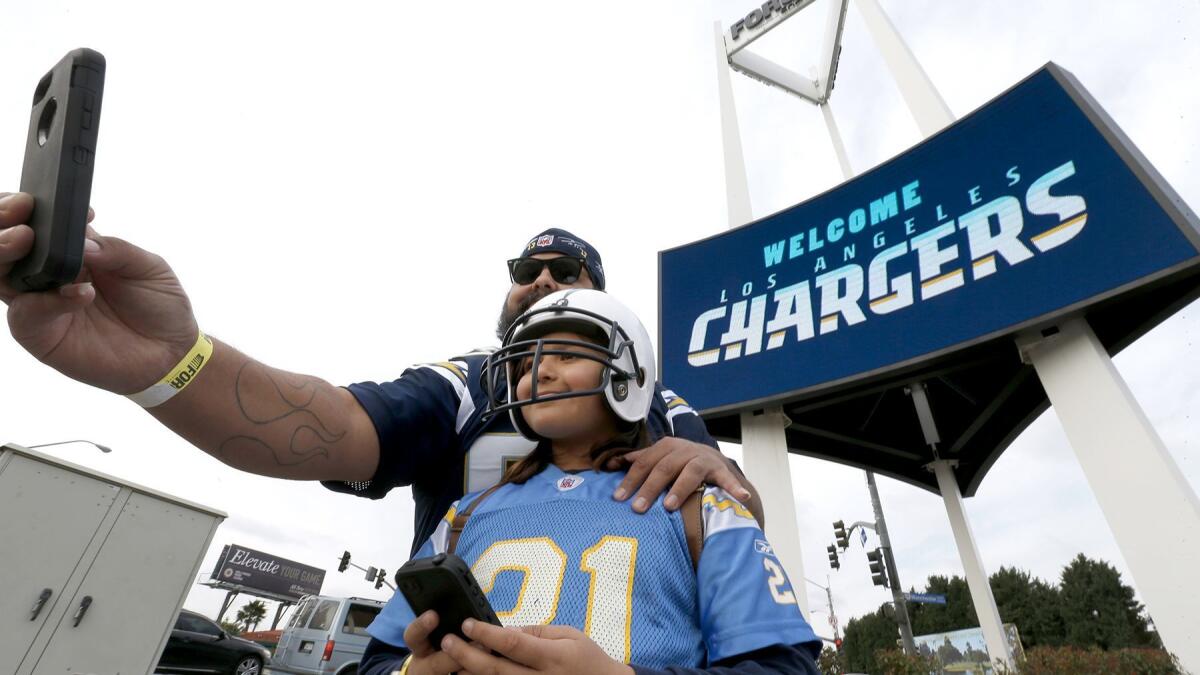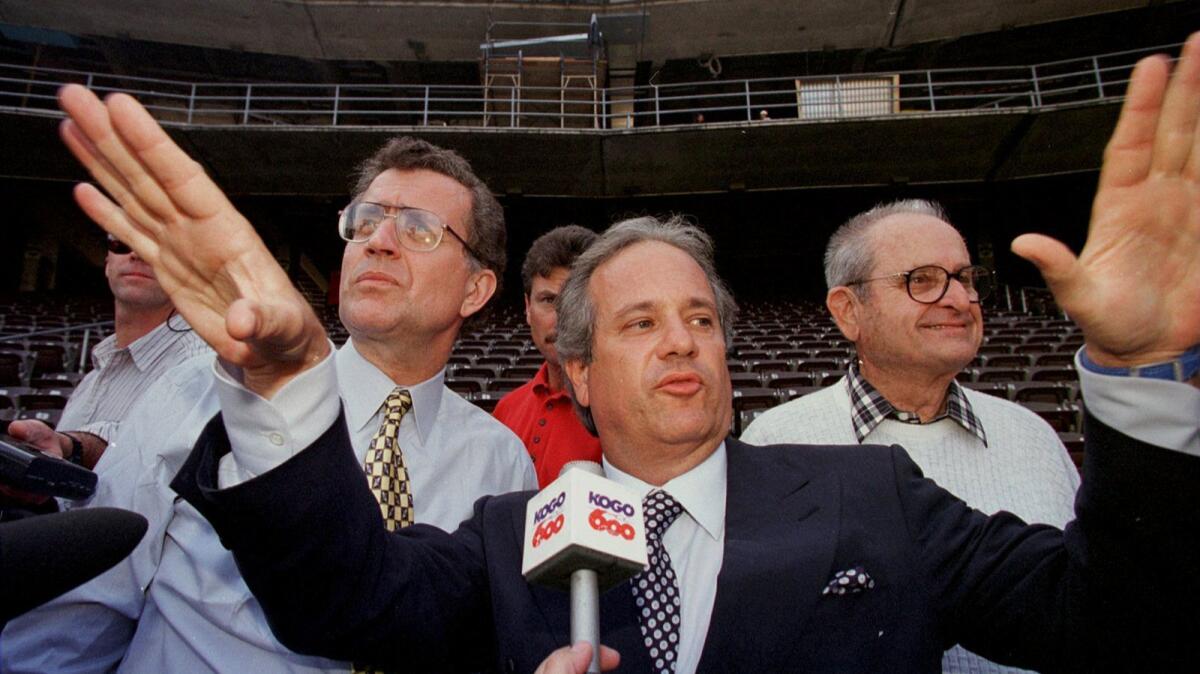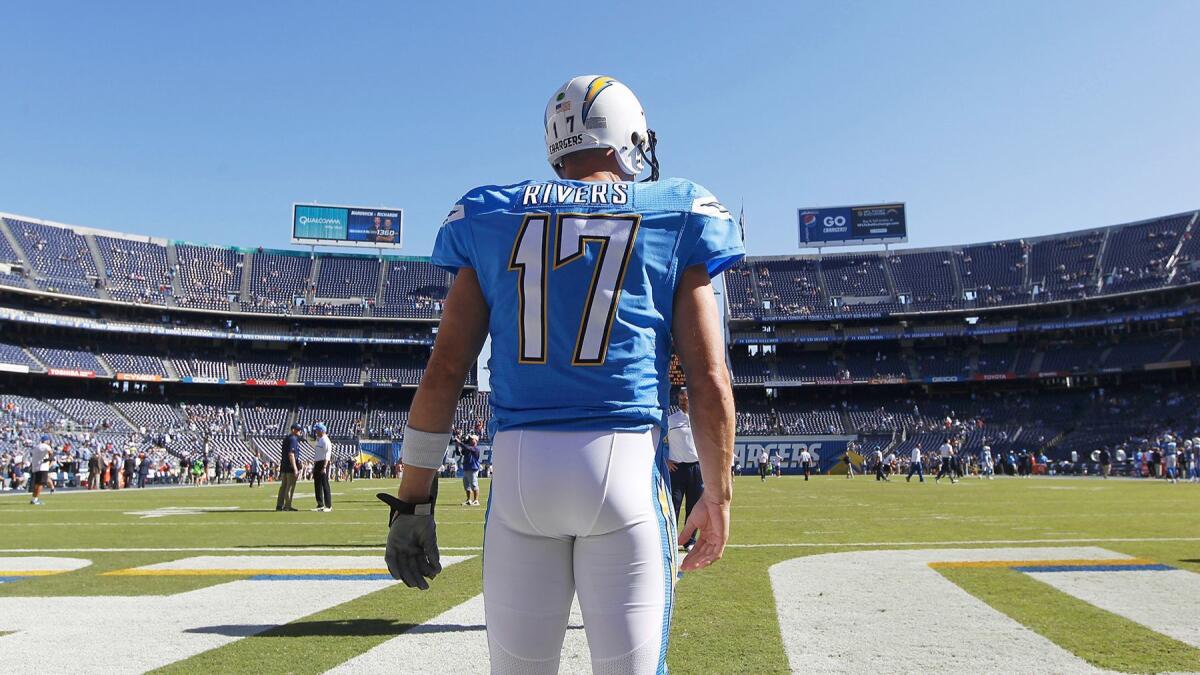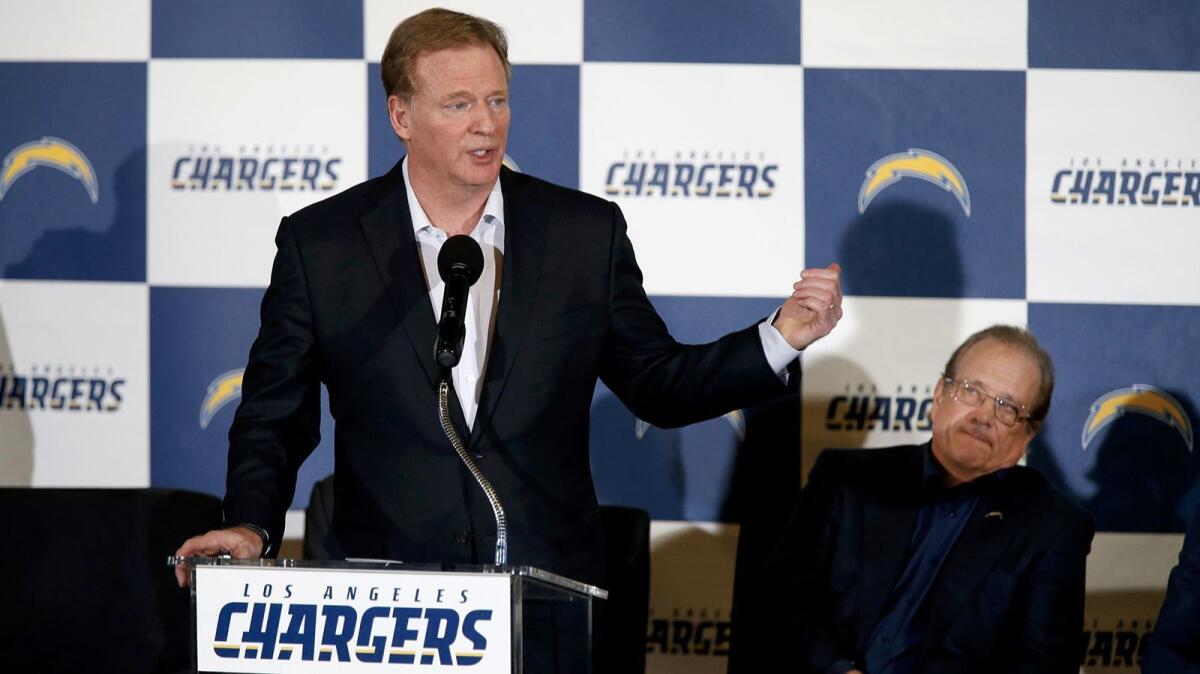Dean Spanos’ decision to move the Chargers to L.A. is the biggest he’ll ever make and one he won’t escape

Dean Spanos was called San Diego’s “most hated man.”
- Share via
The fortune Alex Spanos amassed over six decades began with bologna.
The year was 1951, and the son of a Greek immigrant was unemployed and broke, searching for a way to provide for his wife and two young children. He convinced a Stockton bank to loan him $800 to buy a panel truck and supplies to make bologna sandwiches to sell to migrant farm workers.
The humble beginning grew into a multi-billion dollar collection of businesses, now overseen by his son, Dean, and centered around the family’s most valuable asset: the National Football League’s Chargers.
Dean Spanos took a drastic step with his father’s legacy in January, moving the Chargers to Los Angeles after 56 seasons in San Diego and leaving fans seething in a place he called home.
The key to understanding the younger Spanos’ decision is the man himself — and his family. A large photograph of the Spanos clan dominates the wall behind his desk in an office that overlooks two practice fields at Chargers Park in San Diego. On a credenza, between an NFL record book and a golf club, a copy of his father’s autobiography leans against the wall.
A lone page is dog-eared for quick reference: “A solid family foundation: This is the basis of everything. ... Without family, you will be left emotionally empty, no matter how fabulous your accomplishments.”
Friends say Spanos, 66, felt burdened by a “sacred duty” and “solemn responsibility” to resolve the family’s long-running search for a new stadium in San Diego or elsewhere.
Although known for his deliberate approach to business, the Chargers chairman gambled on the 120-mile drive north into an unforgiving market. It meant leaving San Diego, a place the team owned, for L.A., a sprawling metropolis crowded with college and professional sports. But Spanos didn’t see an alternative.

The decision could add a billion dollars to the franchise value — Forbes estimates the Chargers and the family’s other businesses are already worth $2.4 billion — and boost annual revenue by tens of millions of dollars.
The cost to Spanos, however, extends beyond the NFL’s $650-million relocation fee. In San Diego, fans burned Chargers jerseys and attacked him on social media. A columnist called him a villain and the city’s “most hated man.”
The biggest decision Spanos will make in his career is one he’ll never escape.
“He has suffered so much through this and people can believe it or not, but he’s been tortured by what to do,” said Bertrand Hug, a San Diego restaurateur who considers Spanos his best friend. “At the end, he says, ‘I have no choice. I have to protect my family.’”
::
The bologna sandwich business took off and, by late 1951, Alex Spanos had leased space at the San Joaquin County Fairgrounds to house 350 workers. He furnished it with surplus bedding, according to the autobiography, and served boiled beans and the sandwiches for breakfast, lunch and dinner.
Spanos made $35,000 in the first three months, then expanded the business by moving to an old barracks at the Stockton Metropolitan Airport. He adjusted the menu to include tortillas, rice and beans.
By 1956, the A.G. Spanos Agricultural Catering Service provided 7,000 meals a day and made $700,000 that year — the equivalent of more than $6 million today.
“If I hadn’t made provisions, they would have slept in the fields instead of the beds provided and they would have eaten whatever the farmers could scrounge instead of the three meals I served each day,” Spanos wrote.
At the suggestion of an accountant, Spanos invested some of the windfall in real estate. He founded a construction company that built its first apartment complex in 1961. The Bali Hai in Stockton included a luau pit as part of a South Seas theme. Headquartered in Stockton, the company opened offices in six other states.
Spanos still made time for his favorite hobby: golf. He met Bob Hope in 1969 during a round at Eldorado Country Club in Indian Wells. They played for $100 a hole, according to the autobiography. The entertainer became one of his closest friends. They later performed a song-and-dance routine together at Carnegie Hall in New York.
“When Alex was born,” Hope said in a Times story in 1985, “the doctor slapped him and Alex said, ‘Like to rent an apartment?’”
Dean Spanos started working in his father’s burgeoning empire before he was old enough to drive. The son swept out apartments, dug ditches — he once ruptured a sewage line at the bottom of a 10-foot deep trench — and framed buildings.
The father told the son he had to be the first one at a job site and the last to leave. Everyone watched him. If the owner’s son didn’t care, then why should they?

“It was the greatest experience of my life,” said the younger Spanos, who graduated from the University of the Pacific in 1972 with a degree in business administration.
After a failed bid for the San Francisco 49ers in 1977, Alex Spanos bought majority interest in the San Diego Chargers seven years later for $40 million. The transition from entrepreneur to professional sports owner wasn’t smooth. San Diego fans booed Spanos in 1988 during an on-field ceremony to retire the number of Chargers quarterback Dan Fouts, frustrated by the team’s losing ways. He called it the worst moment of his life.
Spanos rarely took time off; he grew uncomfortable if away from work for more than a few days. He had a hands-on management style, a quick temper and an outsized personality that could intimidate any room.
Gary Plummer, a standout linebacker for the Chargers from 1986 to 1993, remembered how a phone call would warn staff and players at the team’s headquarters that the owner was on his way.
“It was panic,” Plummer said. “It was like cockroaches scattering when you turn on the light. No one wants to be seen by Alex Spanos. All he did was scream and yell at everything.”
Dean Spanos, the oldest of four children, took over the team’s day-to-day operations in 1994. Friends see him as, in many ways, the opposite of his father: shy in public and content to operate behind the scenes, far outside the professional sports spotlight other owners enjoy.

The father began detaching himself from the business and in 2008, revealed he suffers from dementia. Friends and family say he still owns an iron handshake and plays gin rummy for a few hours each day at his Stockton home. But the disease has taken a toll.
“I can’t have the in-depth conversation, which is what I really miss the most,” Dean Spanos said.
Several people close to Spanos believe he is more conciliatory in business dealings than his father. That includes the long, fruitless search for a stadium in San Diego.
“I think he felt this emotional and almost moral compulsion to do everything he possibly could to stay in San Diego and, in my opinion, I think it hurt him,” said Carmen Policy, a friend of the Spanos family and former executive for the 49ers and Cleveland Browns. “He could have moved earlier had he just recognized the reality of the situation there and, in some ways, been better situated in L.A.”
Spanos is sensitive to criticism, more than expected from someone in a business where every transaction, every setback is scrutinized.
“Everything that’s said against him hurts him deeply and he won’t forget it,” Hug said.
With family and close friends — they call him Deno — he is engaging, loyal and usually the first to pick up the check when dining out.
When the son of longtime friend Ross Clark — he works out with Spanos at 6 a.m. most days — wasn’t getting much attention from college football coaches, Spanos stepped in. Without Clark’s knowledge, he arranged for the creation of a highlight tape, sent it to dozens of schools and had a former Chargers player follow up with phone calls. It led to a scholarship for Clark’s son.
::
When NFL owners and executives met in December at the Four Seasons in Irving, Texas, Spanos updated the group on his last-ditch effort to stay in San Diego.
He could have moved the Chargers to L.A. in January 2016 after NFL owners gave the franchise a one-year option to join Stan Kroenke’s Rams at the $2.6-billion stadium he’s building in Inglewood. Instead, the Chargers remained in San Diego.
The team spent $10 million on a ballot measure to raise hotel taxes to help fund a combined stadium and convention center downtown. It needed two-thirds of the vote in November to pass. Spanos planned to stay in San Diego and ask the NFL to extend the option for a year if at least 50% of voters approved the measure — enough support to justify continued pursuit of the project. It mustered just 43%.
Spanos told the closed-door meeting that he did everything he could in San Diego and that more time would not result in a new stadium, according to a person familiar with the remarks.

“This is a decision that I think every one of us would have made,” Arizona Cardinals owner Michael Bidwell said.
In addition to exploring a series of stadium plans in the San Diego region during the last decade and a half, the Chargers flirted with out-of-town options including Las Vegas, the Farmers Field project in downtown L.A. and a stadium in Carson they would have shared with the Oakland Raiders. Nothing came together.
“A whole lot of people screwed up [in San Diego], including the political leadership and the Chargers,” said George Mitrovich, president of The City Club of San Diego and a longtime civic leader. “No one was going to take a bullet for Dean Spanos.”
Spanos and his siblings — Alexis, Dea and Michael — each control 15% of the team, while their father and his wife Faye own 36%, according to two people familiar with the arrangement. Alex Spanos left the responsibility to guide the team and the family’s other holdings to his oldest son.
There wasn’t a family vote or climatic meeting about Los Angeles. Dean Spanos didn’t want to saddle the family’s next generation — his sons John and A.G. run the day-to-day operations for the Chargers — with the search for a new home.
“We don’t always agree. We fight on issues,” said Spanos, who is also chairman and CEO of the family’s non-football companies. “But when it comes time to make these types of decision, we always come together as a group and we do everything in the best interest of the family.”
The day after the move was announced in January, Jeanie Buss hosted a dinner for Spanos at Craig’s in West Hollywood. The Lakers president told him not to hide from the challenge of entering the market, and not to let criticism get him down.
The next day, fans at Staples Center for the Clippers-Lakers game booed when the arena video screen mentioned the Chargers. During a welcome event at the Forum five days later, NFL Commissioner Roger Goodell heaped praise on Kroenke before briefly mentioning Spanos, which some saw as a public sign of the league’s unease over the decision. Some owners and executives regarded the move as hasty and questioned the wisdom of two teams relocating to L.A. in the space of a year.
When Spanos started speaking, one of the 150 fans in attendance, Joseph MacRae, heckled the chairman, thrust his middle fingers in the air and threw a Chargers jersey toward the stage. MacRae said he felt Spanos had betrayed San Diego, that he had opted for money over loyalty.
Spanos hesitated for an instant during the outburst, then continued.
“His approach has been to show back nothing but appreciation and love, because that’s what he feels for all the San Diego fans,” said John Spanos, president of football operations for the Chargers. “No human being would naturally want those things directed at you, but those are the consequences of a decision like this.”
Dean Spanos sometimes talks about giving it all up to run a hamburger stand in Aspen, Colo. He’d flip burgers in the back. His wife Susie would wait tables. They could shut down at 1 or 2 p.m. and go skiing. Life would be simple.
But he’s only joking. When close friends like San Diego lawyer Craig McClellan talk to Spanos, they can sense his excitement, his anticipation about the challenge of restarting in L.A.
There’s a franchise to move, a temporary training facility in Costa Mesa to complete and unending meetings with L.A. business leaders and politicians among a thousand other details in his new life.
“We’re more low-profile than other people, but I know it’s different now,” Spanos said. “I love it. I love the challenge. When people say you can’t do it, the greatest thing in the world is to prove them wrong.”
Times staff writer Sam Farmer contributed to this report.
Twitter: @nathanfenno
More to Read
Go beyond the scoreboard
Get the latest on L.A.'s teams in the daily Sports Report newsletter.
You may occasionally receive promotional content from the Los Angeles Times.










